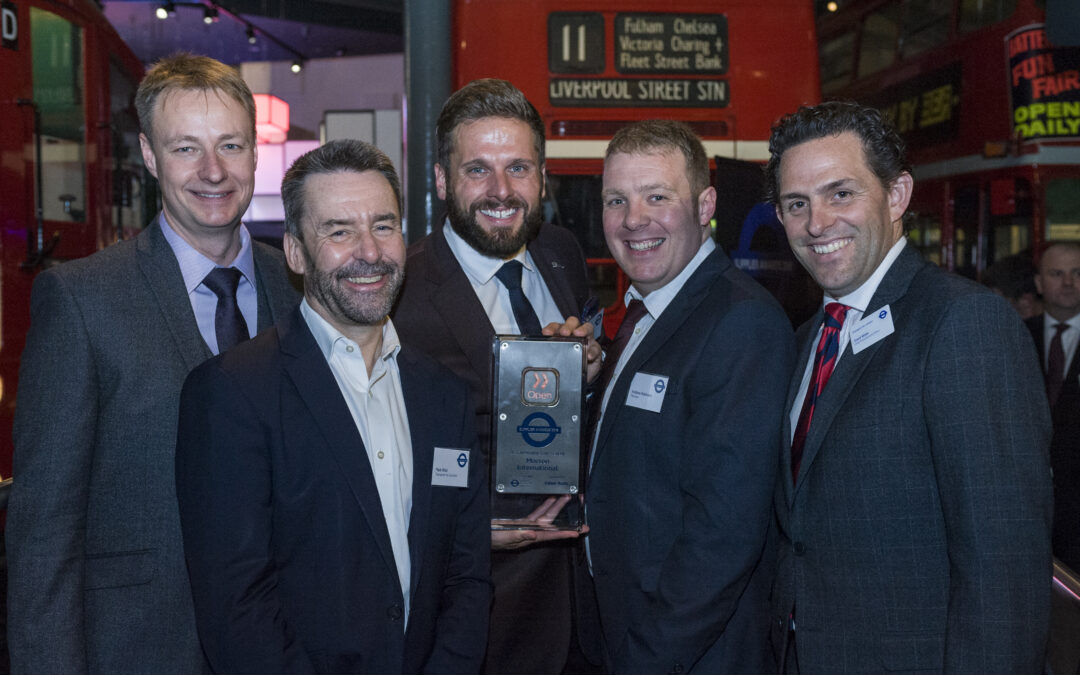North London Partnership Consortium (NLPC) Ltd is a not-for-profit organisation committed to the regeneration and renewal of communities by unlocking the potential of its people to grow and prosper. Since 2021 the NLPC, rail training provider Morson Training, and recruiter Morson Talent have collaborated on a training and employment programme that sees individuals facing unemployment and other socio-economic issues, given access to training and job opportunities within the UK rail infrastructure.
In this interview, John Egbo, director of the North London Partnership Consortium, and Andrew Robinson, business manager at Morson Training explain how the programme is delivering true social value, addressing the skills gap and changing lives in one of London’s most deprived communities.
Tell us about the NLPC and its purpose...
John Egbo:
The NLPC has been active since 2000, operating from Northumberland Park in Tottenham since 2003. We work within a cross-sector, cross-service framework, developing partnerships, within the public, private, and Voluntary and Community sectors designed to provide a seamless pathway into training and sustainable jobs (6 months +) for unemployed and underemployed residents from the most disadvantaged communities. A key aspect of our work is supporting Londoners into London Living Wage paying jobs (currently £11.95).
Examples of our partners include The Department of Work and Pensions (DWP), Bridge Renewal Trust, Ark Resettlement Services, Newlon Housing, Bounce Back Foundation/Divert, Community Police, Rise Projects, and Haringey Community Gold.
How does the NLPC partner with Morson Training and Morson Talent to provide sustainable routes to employment?
John Egbo:
Our relationship with Morson started around two years ago and since then we’ve collaboratively developed an effective training-to-employment programme. Simply, the NLPC has over the years developed a holistic framework for employment engagement. At the core of our work is local knowledge and networks based on a proven track record established over the past 20 years.
For our partnership with Morson – we:
- Undertake promotion, and marketing – raising awareness and access to upcoming opportunities.
- Undertake an initial overview of the Morson opportunity and key requirements, registration, and compliance checks.
- Develop an Individual action plan – including any additional support needed to enable pathway progression (for example include – travel support)
- Where applicable pay for pre- drugs and alcohol tests to limit the potential of failure and disbarment from railway opportunities during Morson’s official ensure test
- Facilitate attendance for the Employer Recruitment open day – including travel support
- In-training support – including travel help for two weeks training
- In work support to help enable job sustainability
Andrew Robinson:
By working with the NLPC we’re able to give wider access to opportunities for training and most importantly, sustainable jobs in one of the top five deprived areas in London where people are desperate for jobs but who may not be aware of or have access to opportunities.
John Egbo:
Together, Morson and NLPC have developed a fantastic proposition for individuals whose previous history or potential history would be traditionally perceived as a hindrance. For example, we deliver a program funded by the Violence Reduction Unit where we support ex-offenders or those who are on a path to be an offender, into employment. Rail can be an ideal sector for these people, especially if they are involved in gangs, as the work takes place predominantly at night, meaning they are away from criminal activity during key hours of action. The job instils a sense of discipline and the drug abstinence requirement of the role provides people with a solid reason to make positive lifestyle changes and avoid any bad influences in their life.
But this doesn’t mean that we put everyone we engage with through the training and employment programme. We only give people a chance who are willing and committed to change. On average, for every 40 people that are referred to us, we end up putting only 20 through the programme. This is because we try to balance the needs of all parties. Individuals need to be motivated to maintain employment and meet the requirements of employers whilst organisations need to be open-minded and place their trust in the people we advocate for.
Andrew Robinson:
A huge positive from Morson Talent and Morson Training’s perspective is that the NLPC and John’s team are pre-screening delegates. This means that rather than 80 people turning up for training and 60 of them being unsuitable, we get 20 motivated individuals who have been pre-identified as suitable for interview.
How do you ensure the individuals you engage with complete the training?
John Egbo:
Understanding the people that we engage with is critical to the success of our programme. Because we work in some of the most socially deprived areas in the country, the majority of individuals we meet have complex personal and social issues. Therefore, no one is referred to the programme without undergoing a one-to-one with an NLPC Employment Advisor- who is assigned to support them throughout their engagement. We need to understand their personal situations and background so we can identify, right from the outset, any additional support that they might need. Unemployment challenges are not just about struggling to get a job, sometimes the person might have housing and other related issues.
We find that if we don’t take the steps to understand an individual’s circumstances then if we do get them a job the other social economic issues happening in their lives can impact their employment. Now we don’t provide everything, but if we understand the issues, we have a network of partners who can help.
A good example of this is drug and alcohol testing. Drug and alcohol tests are a critical element of meeting the requirements for both Morson’s training programme and employers. Therefore, we talk openly, informing delegates that drug and alcohol testing will be part of the process right from the outset, making it clear that we are not setting up anybody to fail.
It’s in the delegate’s best interest for them to let us know if they are going to fail the drug and alcohol test, because if they do they won’t be able to work in the rail sector for five years. To combat this, we have built an unofficial drug and alcohol pre-test that we pay for into the programme. This gives us confidence that when they go to Morson, they’re going to pass the test rather than them failing, being barred from working in the rail sector for 5 years and wasting time and money for all parties. Equally, we have worked with multiple participants who initially failed the Pre-D+A test, only for us to continue working with them, with the goal of enrolling them on a later course. This has provided participants with the motivation to make a permanent lifestyle change and give up smoking, resulting in multiple candidates being accepted onto later courses and excelling.
Andrew Robinson:
As the NLPC is engaging the community and providing wider support around challenges such as housing, abuse and violence, we’ve ended up with a holistic programme that truly helps individuals whilst giving us dedicated, employment-ready people to deploy on the UK’s railways.
Are there any other challenges that the NLPC has to overcome when working with the local community?
John Egbo:
In addition to combatting issues around drugs and alcohol, we have significant issues with postcodes because of gang territories. Some delegates can’t go to certain locations as their safety will be at risk. In response, if the delegate cannot come to our location, we will go to them or we can do everything online with safeguarding. We pay for delegates’ travel to employer recruitment days and training to try to eliminate anything that might be considered a barrier to them.
One huge positive of working with Morson Training is that the training takes place in Canning Town. As it’s an industrial estate there’s no risk of individuals bumping into people they need to avoid.
Tell us about the people who’ve been able to turn their life around because of the training and employment programme.
John Egbo:
Even getting one person into sustainable employment is a huge achievement for us because of the personal journey and history of some of these delegates.
For example, there was a young man with a county-line, drug trafficking background. County lines are particularly problematic as it’s a challenge for individuals to escape that lifestyle as gang members are constantly trying to draw them back in. Despite having significant personal challenges this participant/delegate completed his training course with Morson Training. Another example is a candidate that served time for a serious crime, he was accepted into the programme, completed training, and was able to secure a job on the London Underground via Morson Talent. He progressed quickly from being a Track Operative to a community leader and has managed to turn his life around.
Examples like this just show how powerful this programme is. We’re opening opportunities to people who often find that, because of their criminal or socio-economic background, traditional routes to employment are not available to them.
Andrew Robinson:
By working with the NLPC we’re able to give wider access to opportunities for training and most importantly, sustainable jobs in one of the top five deprived areas in London where people are desperate for jobs but who may not be aware of or have access to opportunities.
Between the NLPC and Morson, there is an opportunity to help people make real lifestyle changes that lead to sustainable and gainful careers. Seeing the delegates progress from this programme has been an inspirational example of people turning their life around.
Dear NLPC,
I would like to send my thanks for your continued support with those that I have referred to you for the railway training. My candidates have all expressed interest in the industry and with your unique opportunity, have given them the opportunity to step into the industry. I have had positive feedback from my candidates in the process and support from yourselves and am confident in the service that I have a few more candidates to refer.
DWP – Community Engagement Officer – Gangs Team – North London District
To find out more about the incredible work the NLPC does in helping individuals from underprivileged communities prosper, click here.


